In recent years, Facebook chatbots often hailed as the next frontier in customer engagement and automation. These bots promise seamless interactions, personalized responses, and efficient customer service.
Yet, amidst the hype surrounding their potential, a critical question looms: are Facebook chatbots truly worth the hype?
Leveraging AI algorithms, Facebook chatbots aim to mimic human conversation, offering users a tailored experience without direct human intervention. It can also streamline communication, enhance user experience, and drive business objectives,
However, the reality often falls short of the lofty promises. And what’s the downside to it?
This analysis delves into the efficacy, limitations, and implications of Facebook chatbots, scrutinizing their utility across various domains.
Continue reading more about the hype around Facebook chatbots and their worthiness.
Understanding the functionality of chatbots on Facebook
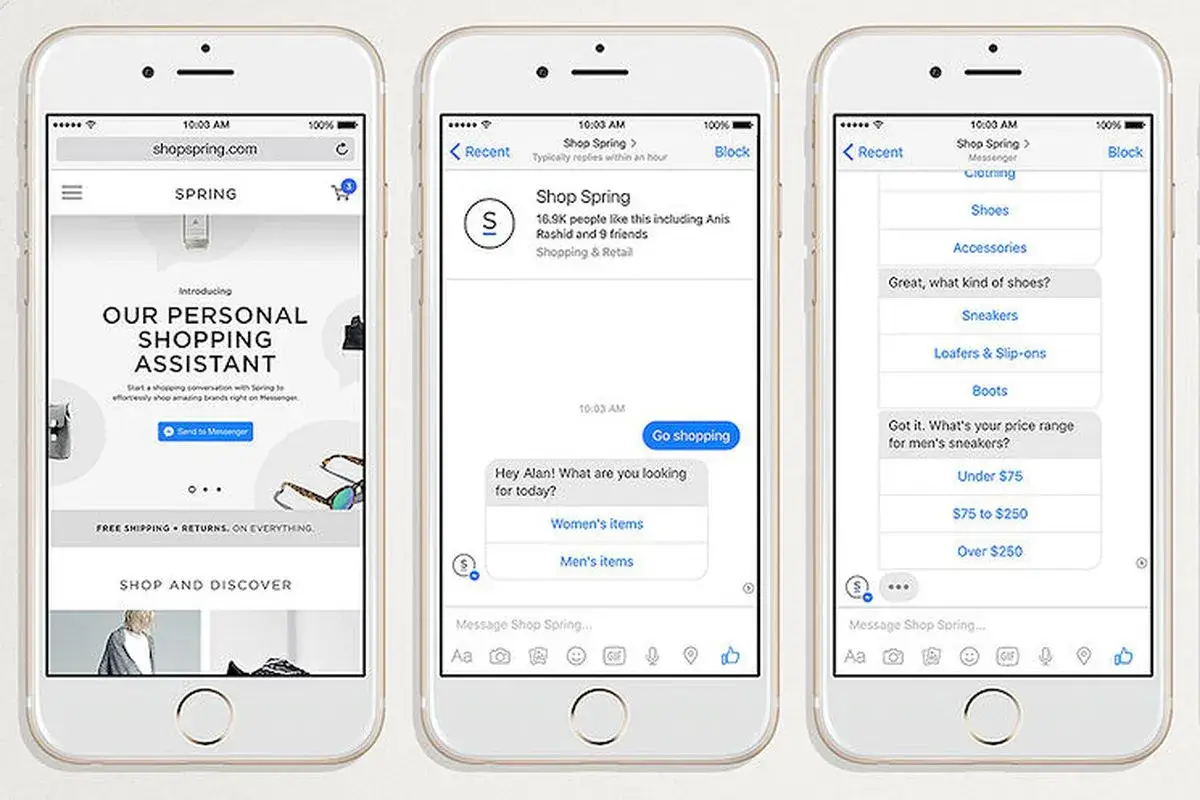
Facebook chatbots are AI-driven virtual assistants that replicate human speech. They are designed to connect with people in a way that is engaging and natural-feeling. These chatbots may be developed using a variety of programming languages and frameworks and have a wide range of uses, from responding to consumer inquiries to making customized suggestions.
Different types of chatbots are available on the platform
There are two primary categories of chatbots on Facebook: AI-powered chatbots and rule-based chatbots.
- Rule-based chatbots: These Facebook chatbots stick to a predetermined set of rules and can only react to particular instructions or phrases. They are perfect for responding to simple client inquiries and providing basic information.
- AI-powered chatbots: Bots that are powered by AI can comprehend and interpret user communications using natural language processing (NLP) and machine learning techniques. With higher levels of sophistication and the ability to manage complicated discussions, they may offer customized replies based on user context.
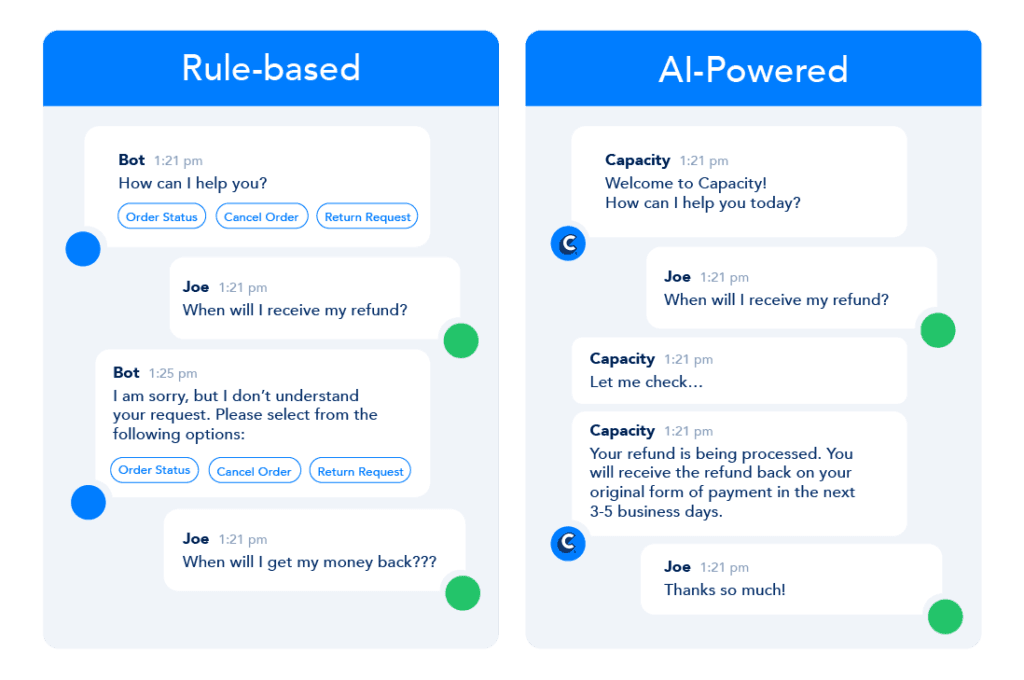
How chatbots interact with users on Facebook?
Facebook chatbots do not limit themselves to a thing or two, they are capable of a lot of different things. They can engage in voice conversations, share images, share videos, and text messages. Users may start a conversation just by sending a message or using the messaging icon on a Facebook page. These chatbots react to what users say, offering information, posing questions, or recommending appropriate options.
Advantages of Using Facebook Chatbots
Let's examine the benefits Facebook chatbots provide now that we have a better knowledge of what they are. Several advantages includes:
Improved customer service and support
Businesses can provide 24/7 quick and effective customer care with chatbots. Customers no longer need to negotiate difficult IVR systems or wait in lengthy lines to acquire the information they want.
The whole customer experience may be improved with chatbots, which can rapidly respond to frequent questions, make product recommendations, and even help with order tracking. For instance Facebook chatbots like BotPenguin provides round the clock availability and support.
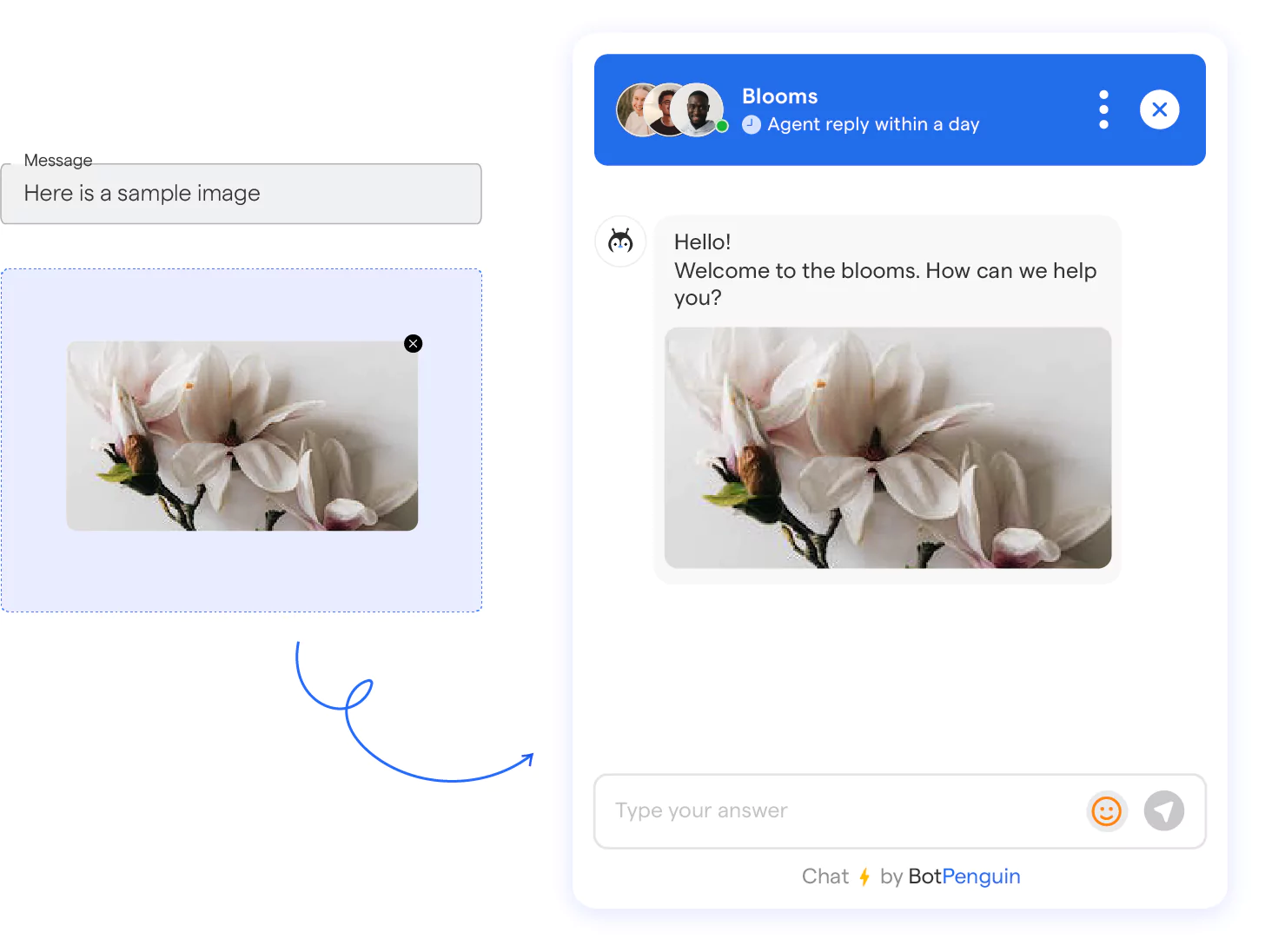
24/7 availability and quick response time
It might not be possible for human agents to be online 24x7. On the other hand, Facebook chatbots are continuously online and prepared to interact with clients, without any restrictions.
Chatbots can respond immediately to requests made at any time, even at 2 a.m. or on a holiday, guaranteeing that clients are never left hanging. This accessibility and quickness help to increase client loyalty and satisfaction.
Personalized user experience and engagement
The capacity of chatbots to provide consumers with personalized interactions is one of its main benefits. Chatbots can modify their suggestions and answers according to unique preferences by reviewing user information and previous encounters. This not only improves user engagement but also helps businesses learn important details about their clients, allowing them to create more specialized marketing efforts.
Suggested Reading:
Cost-effective solution for businesses
A customer care team's hiring and training can cost a firm a lot of money. However, using chatbots makes it unnecessary to have a big customer service staff.
Businesses may cut expenses while still providing high-quality customer service by using chatbots to handle a large part of client inquiries. Chatbots may also respond to several requests at once, enhancing their efficiency.
Automation of mundane tasks and increased efficiency
Businesses often have repetitive processes that are simple to automate. So no need to waste your valuable time gathering consumer information, making appointments, or processing orders when Facebook chatbots can do everything for you.
Businesses might increase overall efficiency by automating such operations to free up their human resources to concentrate on more complex and valuable tasks.
And beginning with Facebook chatbots isn't that tough! Meet BotPenguin, the home of chatbot solutions.
With all the heavy work of chatbot development already done for you, BotPenguin allows users to integrate some of the prominent language models like GPT 4, Google PaLM, and Anthropic Claude to create AI-powered Facebook chatbots that can do things like customer support automation, sending order updates, running abandoned cart recovery campaigns, and more.
- Facebook Automation
- Marketing Automation
- WhatsApp Automation
- Customer Support
- Lead Generation
- Appointment Booking
Limitations of Facebook Chatbots
Facebook chatbots are remarkable, but they do have certain restrictions. Let's examine their flaws in more detail.
Lack of Human Touch and Emotional Connection
Being computer programs, chatbots cannot offer the personal touch and emotional connection that clients often want. Chatbot interactions might come out as rehearsed and impersonal, which makes for a less enjoyable user experience. Customers might want more empathy or understanding than a chatbot can provide, particularly in difficult or delicate circumstances.
Language and Command Limitations
How can we expect computers to fully understand humor when occasionally even humans struggle to recognize it? Despite the huge developments in chatbot technology, it is still challenging to understand and respond to complex or unexpected client demands.
Language quirks, humor, or regional accents might irritate individuals who are attempting to receive assistance and lead to misunderstandings. There is undoubtedly room for growth, but chatbot developers are still primarily focused on improving their natural language processing skills.
Potential Privacy and Security Concerns
Privacy and security are still the main issues with chatbots since they gather and handle user data. Even though developers take great care to handle sensitive data safely, there is still a chance of data breaches or unauthorized access. To gain and keep consumer confidence while observing privacy laws, businesses must prioritize data protection procedures.
Risk of Chatbot Errors and Misunderstandings
Chatbots are still prone to mistakes and misunderstandings despite major advances in artificial intelligence. User dissatisfaction and the goal of using a chatbot might result from inaccurate responses to user requests being misunderstood. To reduce these mistakes, it is essential to continuously analyze, enhance, and refine chatbot algorithms and training data.
Suggested Reading:
Case Studies: Successful Implementation of Facebook Chatbots
There are genuine success stories of Facebook chatbots having significant influence, so it's not all just words. These case studies explain how companies use chatbots to improve client interactions, streamline procedures, and produce results.
Domino's: Simplifying the Pizza Ordering Process
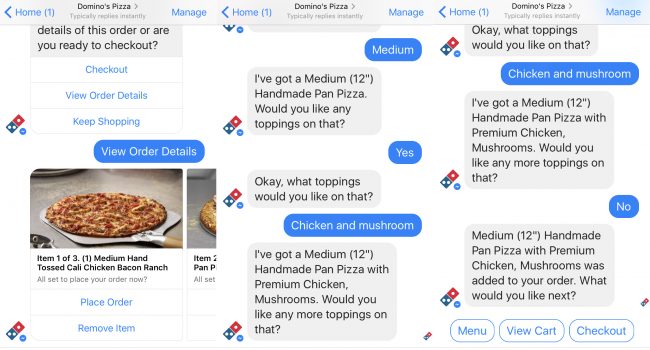
What's your pizza order from Domino? What if they made getting your usual order simpler for you? To make ordering pizza easier, Domino's Pizza launched a chatbot on Facebook Messenger.
Now, clients can place their orders by simply messaging. Users may customize their orders and the chatbot makes use of location services.
The outcome? Domino's saw a notable rise in consumer interaction, better order accuracy, and order handling efficiency.
HubSpot: Enhancing Customer Support
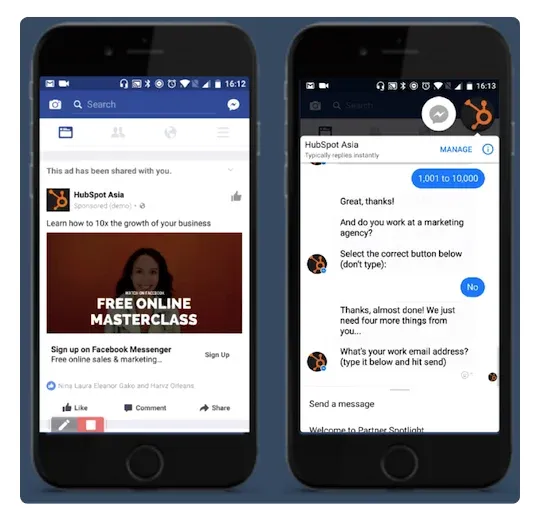
To improve customer service, HubSpot, a well-known marketing automation software, added a chatbot to their Facebook page. The chatbot answered commonly asked queries instantly and pointed users towards pertinent resources.
HubSpot was able to increase its customer support operations without raising costs by cutting response times and enhancing customer happiness.
Spotify Jukebox: Personalized Music Recommendations
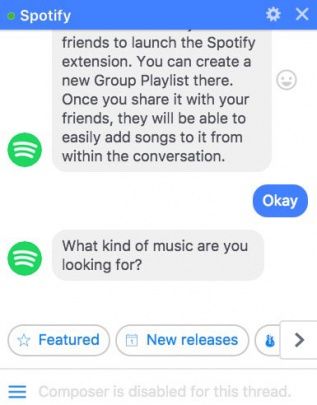
The well-known music streaming service "Spotify," created a chatbot for Facebook Messenger to assist customers in finding new music recommendations. Users were engaged with the chatbot by asking about their preferences and receiving customized playlists in return.
In addition to improving the user experience, this raised user engagement, which resulted in longer app usage sessions and higher subscriber retention.
Are Facebook Chatbots Worth the Hype?
Facebook chatbots have generated significant hype in digital marketing and customer service. These automated programs promise to engage with users in natural language, providing information, answering queries, and even facilitating transactions. However, reality often falls short of the hype.
While Facebook chatbots offer scalability and 24/7 availability, their effectiveness is limited by their ability to understand and respond appropriately to user inquiries. Many users find chatbot interactions frustrating due to their inability to comprehend nuanced language or handle complex requests.
Moreover, the user experience with chatbots can be impersonal and robotic, failing to replicate the warmth and empathy of human interaction. This can lead to user dissatisfaction and abandonment of the chat session.
However, despite these drawbacks, Facebook chatbots still hold potential for businesses. When properly implemented and integrated with human support when needed, they can streamline customer service processes, provide quick responses to common queries, and gather valuable data for future improvements.
Future Prospects and Trends of Facebook Chatbots
Facebook chatbots have an exciting future ahead of them. The way that chatbots interact with customers and organizations is about to change as a result of new trends including AI development, increasing personalization, and greater integration. Let's look at these digital companions' potential for the future.
Predictions for the Evolution of Chatbot Technology on Facebook
The future of chatbot technology on Facebook is exciting and full of opportunities, as it is continually evolving. We'll look at developments in natural language generation and processing that make it possible for chatbots to interact more like real people. We'll also examine how speech recognition technology may be included and how it could impact how people engage with chatbots. With Facebook's dedication to innovation, chatbot technology has countless potential applications.
Integration of AI and Machine Learning Advancements
The potential for chatbot skills is incredible when machine learning (ML) and artificial intelligence (AI) breakthroughs are combined. AI and ML could enhance user interactions, allow for more precise replies, and allow chatbots to evolve. These technologies, whether it is sentiment analysis, recommendation systems, or anticipating user demands, are set to flourish
Impact on Various Industries and Sectors
There are many creative methods in which chatbots are being used, these are already making an effect across multiple industries. Chatbots are boosting productivity, offering individualized experiences, and fueling corporate development across a range of industries, including healthcare, education, sales, and customer service. Businesses may use chatbots to stand out from their competition in their particular industry by remaining on the cutting edge.
User Expectations and Changing Trends in Chatbot Usage
Facebook chatbot technology is continuously developing but it does not end there, user expectations and patterns are also expanding. We'll look at how chatbot usage is changing, including how asynchronous messaging is becoming more popular, the requirement for a smooth omnichannel experience, and the growing desire for chatbots that can comprehend and empathize with users. Businesses may create enduring customer connections and increase user happiness by adjusting to these shifting expectations.
Conclusion
In conclusion, the analysis of Facebook chatbots reveals a mixed bag of potential and limitations. While these AI-driven tools offer promising benefits such as improved customer service, personalized interactions, and streamlined processes, their effectiveness hinges on several factors.
Firstly, the design and implementation of Facebook chatbots play a crucial role. A well-crafted chatbot with natural language processing capabilities can enhance user experience and engagement. However, limitations in understanding complex queries or providing nuanced responses can lead to frustration and disengagement.
The evolving nature of AI technology impacts the performance of Facebook chatbots. Advancements in machine learning and AI algorithms can potentially enhance chatbot capabilities over time, making them more efficient and intelligent.
Furthermore, the integration of Facebook chatbots within broader marketing and business strategies is essential for maximizing their potential. When utilized strategically, these bots can drive lead generation, increase sales, and foster brand loyalty.
Despite the hype surrounding Facebook chatbots, it's crucial to approach their adoption with realistic expectations. The worth of Facebook chatbots depends on how effectively they are leveraged to meet specific business objectives and user needs.
Suggested Reading:
Facebook Automation Bot: Automate Leads, Posts, and Messages
Frequently Asked Questions (FAQs)
Are Facebook chatbots effective for businesses?
Yes, Facebook chatbots can be effective for businesses as they provide automated customer support, engage users in conversations, and help generate leads. They can save time and resources while increasing efficiency.
How do Facebook chatbots work?
Facebook chatbots use artificial intelligence to communicate with users through Facebook Messenger. They can understand natural language inputs and provide automated responses based on programmed algorithms.
Can Facebook chatbots improve customer support?
Yes, Facebook chatbots can improve customer support by providing quick and accurate responses to commonly asked questions. They can handle multiple inquiries simultaneously and offer 24/7 assistance.
Do Facebook chatbots require coding skills to set up?
Setting up Facebook chatbots typically requires coding or programming skills. However, there are also user-friendly chatbot platforms like BotPenguin available that allow users to create and deploy chatbots without extensive coding knowledge.
Are Facebook chatbots customizable?
Yes, Facebook chatbots can be customized to align with a business's brand and tone of voice. They can be programmed to provide specific responses, display custom messages, and even execute actions like making product suggestions or sending notifications.
Can Facebook chatbots be integrated with other business tools?
Yes, Facebook chatbots can be integrated with other business tools and platforms, such as CRM systems or email marketing software, to streamline business processes and provide a seamless user experience.

